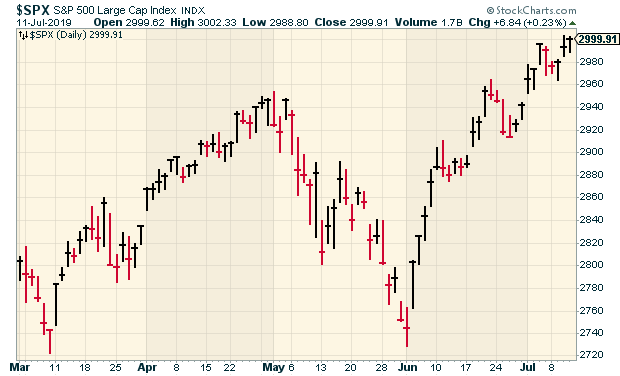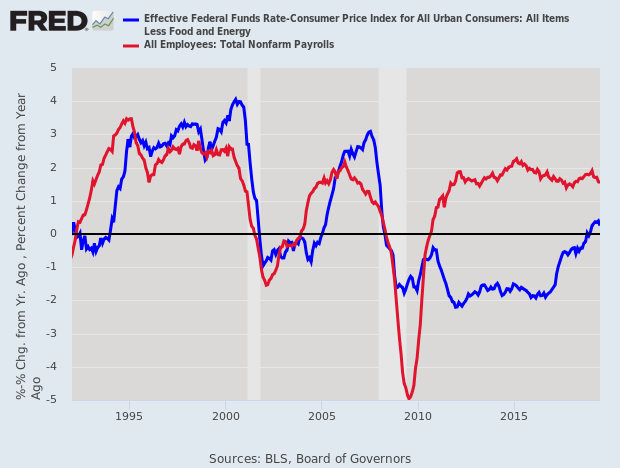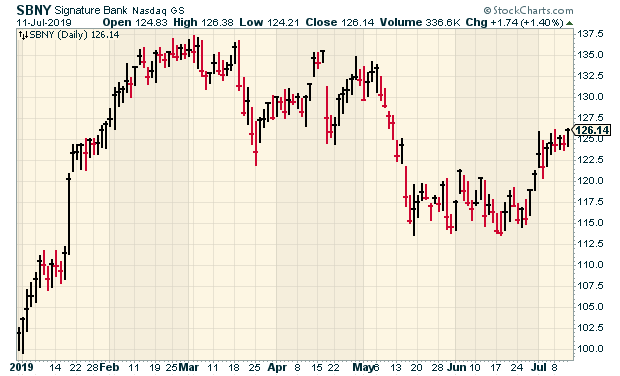CWS Market Review – July 12, 2019
“We don’t have any basis, or any evidence, for calling this a hot labor market.”
– Jerome Powell
Future historians will note that on Wednesday, July 10 at 9:50 a.m. ET, the S&P 500, for the first time ever, broke through 3,000.
Sure, it fell back again, but it really did happen. Then on Thursday, the Dow broke above 27,000.
What was the cause of this latest rally? That came in the form of Fed Chairman Jay Powell. The Fed head spoke before Congress this week and strongly hinted that the Fed was ready to lower interest rates. How many times is still not known, but Wall Street is pleased with the news. Since June 3, the S&P 500 is up over 9%.
In this week’s CWS Market Review, I’ll go over the latest from the Fed. Also, earnings season is upon us. We have our first Buy List earnings reports coming next week. I’ll preview what’s in store.
The Fed Signals It’s Ready to Cut Rates
Last Friday, shortly after I sent you last week’s issue, the government reported that the U.S. economy created 224,000 net new jobs in June. That was an impressive figure, and it was higher than Wall Street had been expecting. The unemployment rate rose a tick to 3.7%.
On Thursday, we got a CPI report that was a bit higher than expected. The government said that inflation rose 0.1% last month, while the “core rate,” which ignores food and energy, rose by 0.3%. That was the highest jump for core inflation since early 2018.
Also on Thursday, the jobless-claims report fell to 209,000. That’s the lowest in three months.
Taking these three news items together, it appears that the labor market is doing well, and there may be cost pressures building in the economy.
This seems to have had zero effect on the Federal Reserve and its plans for interest rates. This week was the Humphrey-Hawkins testimony. This is the law that requires that the Chairman of the Federal Reserve to go to Capitol Hill twice a year to testify before the House and Senate Committees.
(Years ago, I used to go to these. Once I got the coveted the seat directly behind Bernanke.)
The chairman was asked directly if he thought the labor market was running hot. He said, “We don’t have any basis, or any evidence, for calling this a hot labor market.” That’s unusually frank language for a Fed chair. They’re trained to speak in Obfuscation.
Also this week, we got the minutes from the Fed’s June meeting. They seemed to indicate a growing consensus at the Fed for an interest-rate cut.
Consequently, on Thursday, the Dow, Nasdaq and S&P 500 all closed at record highs. The unemployment rate is near a 50-year low, and the Fed is ready to rescue us. I have to admit that I don’t see the need for a rate cut right now. I thought the December hike was a mistake, so I suppose I can see one rate cut. Wall Street, however, sees a string of rate cuts coming our way. According to the futures markets, there’s a 100% chance of a cut at the end of this month. It’s hard to get more certain than that.
That’s not all. Traders think there’s a 70% chance of another cut in September, plus a third rate cut in December. That could be right. Chairman Powell said, “we hear lots of reports of companies having a hard time finding qualified labor; nonetheless, we don’t really see wages responding.”
One concern is that if the Fed doesn’t cut, then it would be out of alignment with monetary policy in Europe. The European Central Bank may start a new round of bond buying. In fact, the ECB may soon cut interest rates again, which are already negative. Inflation expectations have plunged in Europe.
Here’s an interesting chart. The blue line is the real Fed funds rate based on core inflation. The red line is the year-over-year growth in nonfarm payrolls. These two lines had a fairly moderate correlation that was broken apart by the last recession.
Can the Fed cut rates when the market is near an all-time high? Ryan Detrick ran the numbers and found that since 1980, the Fed has cut rates 17 times when the S&P 500 was within 2% of a new high. One year later, the market was higher all 17 times.
One of the good aspects of our style of investing is that we don’t need to predict Fed policy. While I find the Fed’s plans to be stronger than necessary, they don’t alter our basic approach. The important takeaways are that lower short-term rates are mostly bullish for the stock market. Lower short rates usually allow for higher equity valuations. Indeed, that probably explains why the market jumped to new highs this week.
There are also important internal changes to the market. When short-term rates fall, high-dividend stocks are more appealing. We can certainly see that effect in our portfolio. Conversely, financial stocks tend to lag as rates fall. (Please note that I’m speaking in very general terms.)
This week has been a good one for our Buy List. We’re up more than 22% this year. But second-quarter earnings season is about to start. Let’s take a closer look.
Second-Quarter Earnings Preview
There’s hasn’t been a lot of news about our stocks recently. Mostly, it’s been a broad rally, and several of our stocks have made new 52-week highs. On Thursday, both Cerner (CERN) and Moody’s (MCO) made new highs. Both stocks are up over 40% for us this year and have a chance of dethroning FactSet (FDS) as our top performer this year.
Here’s a list of our stocks, the reporting date and Wall Street’s consensus. I have to include my typical warning that these dates and numbers sometimes change. Some companies are, shall we say, not overly forthcoming when it comes to shareholder communication.
| Company | Ticker | Date | Estimate |
| Eagle Bancorp | EGBN | 17-Jul | $1.12 |
| Danaher | DHR | 18-Jul | $1.16 |
| RPM International | RPM | 22-Jul | $1.14 |
| Sherwin-Williams | SHW | 23-Jul | $6.40 |
| Torchmark | TMK | 24-Jul | $1.65 |
| Check Point Software | CHKP | 24-Jul | $1.37 |
| Cerner | CERN | 24-Jul | $0.64 |
| Stryker | SYK | 25-Jul | $1.94 |
| AFLAC | AFL | 25-Jul | $1.07 |
| Hershey | HSY | 25-Jul | $1.17 |
| Raytheon | RTN | 25-Jul | $2.64 |
| Moody’s | MCO | 31-Jul | $2.00 |
| Church & Dwight | CHD | 31-Jul | $0.52 |
| Cognizant Technology Solutions | CTSH | 31-Jul | $0.92 |
| Intercontinental Exchange | ICE | 1-Aug | $0.93 |
| Disney | DIS | 6-Aug | $1.76 |
| Becton, Dickinson | BDX | 6-Aug | $3.07 |
| Signature Bank | SBNY | TBA | $2.71 |
| Fiserv | FISV | TBA | $0.81 |
| Continental Building Products | CBPX | TBA | $0.52 |
| Broadridge Financial | BR | TBA | $1.71 |
I want to cover two earnings reports scheduled for next week.
Eagle Bancorp (EGBN) is due to report on Wednesday, July 17. Three months ago, the bank missed earnings by one penny per share. I’m not too concerned by that.
Eagle is currently going through a transition after the former CEO, Ron Paul, announced his retirement. Susan G. Riel had been the interim President and CEO, and now she’s taken those positions permanently.
About the Q1 results, Riel said, “The Company’s assets ended the quarter at $8.39 billion, representing 9% growth over the first quarter of 2018. First-quarter 2019 earnings resulted in a return on average assets of 1.62% (1.85% excluding nonrecurring costs as defined above) and a return-on-average tangible common equity of 13.38% (15.26% excluding nonrecurring costs as defined above).”
For Q2, Wall Street expects earnings of $1.12 per share. EGBN is currently going for just over 11 times next year’s earnings estimate.
Danaher (DHR) is scheduled to report its earnings the following day, on July 18. Three months ago, Danaher reported Q1 earnings of $1.07 per share. That was three cents more than estimates.
Danaher has been quite busy this year. The company is buying GE’s biopharma business for $21.4 billion. Danaher said it expects Q2 earnings to range between $1.13 and $1.16 per share. The company lowered its full-year guidance. The previous range was $4.75 to $4.85 per share. The new range is $4.72 to $4.80 per share. This reflects the share dilution to buy GE Biopharma. The deal should close sometime in Q4.
Sometime in the second half of this year, Danaher will IPO Envista Holdings, which is their dental business. The ticker symbol will be NVST. Shares of DHR hit a new 52-week high last week.
I’m also going to include Signature Bank (SBNY). The bank hasn’t said yet when it will report earnings, but going by previous years, July 18 is a good candidate.
Signature may be one of our most frustrating stocks to own. The stock seems to move in big streaks. SBNY was a 30% winner for us this year by February 11. After that, it started to lag. Fortunately, SBNY is on the rise again.
Three months ago, the shares got dinged after the bank missed estimates by 12 cents per share. For Q2, Wall Street expects earnings of $2.71 per share. The stock is currently going for about ten times next year’s earnings. With the earnings report, the bank may increase its dividend as well.
That’s all for now. In addition to earnings reports, there are some key economic reports next week. On Tuesday, we’ll get the latest report on retail sales and industrial production. Then on Wednesday, the report on housing starts is released. Thursday is jobless claims, and Friday is consumer confidence. We’ll also get an update on the budget for this year. Be sure to keep checking the blog for daily updates. I’ll have more market analysis for you in the next issue of CWS Market Review!
– Eddy
P.S. Next Friday, July 19, I’ll be on Bloomberg TV’s market wrap segment at 4 p.m. Tune in!
Posted by Eddy Elfenbein on July 12th, 2019 at 7:08 am
The information in this blog post represents my own opinions and does not contain a recommendation for any particular security or investment. I or my affiliates may hold positions or other interests in securities mentioned in the Blog, please see my Disclaimer page for my full disclaimer.
-
-
Archives
- March 2025
- February 2025
- January 2025
- December 2024
- November 2024
- October 2024
- September 2024
- August 2024
- July 2024
- June 2024
- May 2024
- April 2024
- March 2024
- February 2024
- January 2024
- December 2023
- November 2023
- October 2023
- September 2023
- August 2023
- July 2023
- June 2023
- May 2023
- April 2023
- March 2023
- February 2023
- January 2023
- December 2022
- November 2022
- October 2022
- September 2022
- August 2022
- July 2022
- June 2022
- May 2022
- April 2022
- March 2022
- February 2022
- January 2022
- December 2021
- November 2021
- October 2021
- September 2021
- August 2021
- July 2021
- June 2021
- May 2021
- April 2021
- March 2021
- February 2021
- January 2021
- December 2020
- November 2020
- October 2020
- September 2020
- August 2020
- July 2020
- June 2020
- May 2020
- April 2020
- March 2020
- February 2020
- January 2020
- December 2019
- November 2019
- October 2019
- September 2019
- August 2019
- July 2019
- June 2019
- May 2019
- April 2019
- March 2019
- February 2019
- January 2019
- December 2018
- November 2018
- October 2018
- September 2018
- August 2018
- July 2018
- June 2018
- May 2018
- April 2018
- March 2018
- February 2018
- January 2018
- December 2017
- November 2017
- October 2017
- September 2017
- August 2017
- July 2017
- June 2017
- May 2017
- April 2017
- March 2017
- February 2017
- January 2017
- December 2016
- November 2016
- October 2016
- September 2016
- August 2016
- July 2016
- June 2016
- May 2016
- April 2016
- March 2016
- February 2016
- January 2016
- December 2015
- November 2015
- October 2015
- September 2015
- August 2015
- July 2015
- June 2015
- May 2015
- April 2015
- March 2015
- February 2015
- January 2015
- December 2014
- November 2014
- October 2014
- September 2014
- August 2014
- July 2014
- June 2014
- May 2014
- April 2014
- March 2014
- February 2014
- January 2014
- December 2013
- November 2013
- October 2013
- September 2013
- August 2013
- July 2013
- June 2013
- May 2013
- April 2013
- March 2013
- February 2013
- January 2013
- December 2012
- November 2012
- October 2012
- September 2012
- August 2012
- July 2012
- June 2012
- May 2012
- April 2012
- March 2012
- February 2012
- January 2012
- December 2011
- November 2011
- October 2011
- September 2011
- August 2011
- July 2011
- June 2011
- May 2011
- April 2011
- March 2011
- February 2011
- January 2011
- December 2010
- November 2010
- October 2010
- September 2010
- August 2010
- July 2010
- June 2010
- May 2010
- April 2010
- March 2010
- February 2010
- January 2010
- December 2009
- November 2009
- October 2009
- September 2009
- August 2009
- July 2009
- June 2009
- May 2009
- April 2009
- March 2009
- February 2009
- January 2009
- December 2008
- November 2008
- October 2008
- September 2008
- August 2008
- July 2008
- June 2008
- May 2008
- April 2008
- March 2008
- February 2008
- January 2008
- December 2007
- November 2007
- October 2007
- September 2007
- August 2007
- July 2007
- June 2007
- May 2007
- April 2007
- March 2007
- February 2007
- January 2007
- December 2006
- November 2006
- October 2006
- September 2006
- August 2006
- July 2006
- June 2006
- May 2006
- April 2006
- March 2006
- February 2006
- January 2006
- December 2005
- November 2005
- October 2005
- September 2005
- August 2005
- July 2005



 Eddy Elfenbein is a Washington, DC-based speaker, portfolio manager and editor of the blog Crossing Wall Street. His
Eddy Elfenbein is a Washington, DC-based speaker, portfolio manager and editor of the blog Crossing Wall Street. His